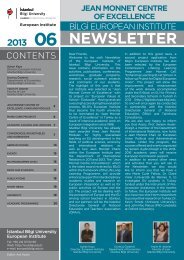WP2 Turkey: Country Report - İstanbul Bilgi Üniversitesi | AB Enstitüsü
WP2 Turkey: Country Report - İstanbul Bilgi Üniversitesi | AB Enstitüsü
WP2 Turkey: Country Report - İstanbul Bilgi Üniversitesi | AB Enstitüsü
You also want an ePaper? Increase the reach of your titles
YUMPU automatically turns print PDFs into web optimized ePapers that Google loves.
Social Impact of Emigration and Rural-Urban Migration in Central and Eastern Europe<br />
VT/2010/001<br />
payment and access to health care services during the time the migrant and dependants<br />
would spend in <strong>Turkey</strong>. This is especially relevant for their temporary visits to the country<br />
during holiday times etc. There are, of course, some extensions to these arrangements: for<br />
instance, the migrant workers in Germany are granted some special allowances to safeguard<br />
their income maintenance if they get unemployed and run-off their unemployment benefit<br />
entitlements in Germany. Then, these workers are provided with the “premium rebate” where<br />
all past contributions are paid as lump-sum rebate to the migrant and dependants (Holzmann<br />
et al., 2005). According to the agreement, this is paid by German Insurance when migrants<br />
are permanently leaving the host country and returning to their home country. The lump sum<br />
payment reflects only the contributions made by the migrant, but does not include the<br />
employer’s part of contributions. Holzmann et al. (2005) mention that this provision is not<br />
much used by returning migrants, at least not since 1984 when Germany for the last time<br />
granted a subsidy for returning migrants who opted out of the German pension system via<br />
lump sum payments.<br />
The social insurance system in <strong>Turkey</strong> also allows for double pension earnings for any<br />
migrant worker who would be willing to make the necessary payments. This means that<br />
regardless of the existence of bilateral agreements, migrant workers (holding Turkish<br />
citizenship) would engage into “indebtedness agreement” with the social security institution<br />
in <strong>Turkey</strong>, on a voluntary basis, declaring that they are willing to make the payment<br />
amounting to the value of their contribution history in the employment in the foreign country<br />
formally documented as if it had been in <strong>Turkey</strong>. As for the daily premium contribution<br />
amounts, lower and upper thresholds are set by the Social Security Institution so as to<br />
determine the level of pension benefits that the returnee migrant would be entitled to after<br />
the lump-sum payment of the value of the contribution history. The contribution history would<br />
be calculated as net of time spent out of employment. 18 The number of pensioners who opted<br />
for this voluntary scheme is around 200.000 but most probably will increase substantially due<br />
to the agreement to prevent double tax liabilities of the pensioners that has been recently<br />
signed with Germany (http://www.sabah.com.tr/Ekonomi/2011/11/21/gurbetci-turkiyedeemeklilik-istiyor).<br />
The average pension is around 700 TL (ca. 295 EUR).<br />
<strong>Turkey</strong> recently goes through some problems in terms of the transfer of social security<br />
payments. Austria had unilaterally cancelled in 1996 the Austrian-Turkish bilateral social<br />
security agreement in order not to pay child benefits to the children of Austrian-Turks<br />
residing in <strong>Turkey</strong>. The new bilateral agreement put into force in 2000 does not include child<br />
benefits anymore. On the other hand, the Netherlands has also been taking precautions to<br />
prevent the transfer of supplementary non-contributory cash benefits amounting to 33 EUR<br />
per month to <strong>Turkey</strong> since 2000. Each time the Turkish Embassy and the relevant attaches<br />
in the Netherlands take these individual cases to the court, and the court has always decided<br />
favourably for the Turkish citizens. So far, these payments reached a total amount of 10<br />
million Euro (Fuat Boztepe, personal interview, 2 August 2011).<br />
3.3. Poverty and Social Exclusion<br />
Official poverty figures are available only from 2003 to 2009 for absolute poverty (income<br />
below a particular fixed threshold determined through a joint work with World Bank) and from<br />
2006 to 2009 for relative poverty (those earning below 60% of median income) (See Figure<br />
6). The figures from 2003 onwards reflect a downward trend until 2006 in poverty, reflecting<br />
recovery from the financial crisis of 2000-2001 and high economic growth in the following<br />
period. Due to lack of data for earlier periods it is not possible to observe the impact of the<br />
mass emigration period on poverty through time with official data.<br />
We could inquire about particular groups that may be at risk of poverty due to migration. One<br />
such group is the lone parents, mostly women, who are left behind as their husbands leave<br />
<strong>Turkey</strong> to find job. To compare poverty rates among such households (those with a single<br />
18 This includes unemployment, vacation and any time that is spent out of the foreign country, which<br />
should be documented with the entry and exit records in the passport.<br />
Final <strong>Country</strong> <strong>Report</strong> <strong>Turkey</strong> 14



